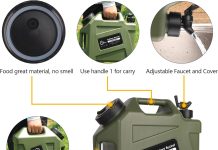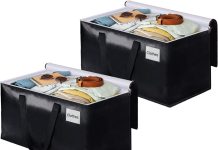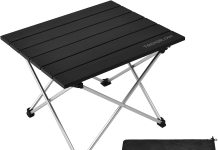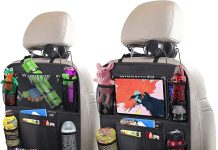Planning your first camping trip can be both thrilling and overwhelming. As first-time campers, we all want to make sure that everything goes smoothly and that we have an unforgettable experience in the great outdoors. However, there are a few common mistakes that many beginners often make. In this article, we will guide you through some essential tips that will help you avoid these blunders and set you up for a successful and enjoyable camping adventure. From choosing the right campsite to packing the necessary gear, we’ve got you covered. So, get ready to embark on your first camping trip with confidence!
Review contents
Choosing the Right Campsite
Researching Campsite Options
When it comes to choosing the right campsite, research is key. We want to make sure we pick a campsite that suits our needs and preferences. Start by looking for campsites in the area where we want to go camping. There are many resources available online, such as camping websites and forums, that provide reviews and information about different campsites. Reading reviews from other campers can give us a good idea of what to expect at a particular campsite. We can also consider factors such as the accessibility of the campsite, the availability of amenities, and the proximity to attractions or hiking trails.
Considering the Campsite Amenities
The amenities offered at a campsite can greatly enhance our camping experience. Some campsites offer facilities such as showers, toilets, and electricity, while others may be more primitive. We should consider what amenities are important to us and choose a campsite that meets our needs. For those who prefer a more rustic camping experience, a campsite with few amenities may be ideal. On the other hand, if we prefer a bit more comfort, a campsite with modern facilities may be the better choice. Take into account the availability of water sources, picnic tables, fire pits, and other amenities that can make our stay more enjoyable.
Checking the Campsite Rules
Before we finalize our campsite selection, it is important to check the campsite rules. Different campsites may have different rules and regulations that we need to be aware of. Some campsites have restrictions on the number of campers allowed per site or the types of equipment that can be used. It’s also important to be aware of any rules regarding quiet hours, fire regulations, and the use of generators. By familiarizing ourselves with the campsite rules beforehand, we can ensure we have a smooth and enjoyable camping experience without any surprises.
Packing Essentials for Camping
Making a Camping Checklist
Packing for a camping trip can be overwhelming, especially for first-timers. To avoid forgetting any essential items, it is crucial to make a camping checklist. The checklist should include everything we will need for our camping adventure, from the basics like tents, sleeping bags, and cooking utensils to personal items like clothing, toiletries, and medication. We can divide the checklist into different categories to make it easier to organize, such as shelter, food, clothing, and tools. Checking items off the list as they are packed will help ensure that we have everything we need and minimize the chances of forgetting something important.
Bringing Appropriate Clothing and Footwear
Having the right clothing and footwear can greatly enhance our camping experience. We should pack clothes that are suitable for the weather conditions we expect to encounter, including layers for varying temperatures. It is also important to bring appropriate footwear for hiking and walking around the campsite. Comfortable and sturdy shoes or hiking boots can make a world of difference when exploring the outdoors. Additionally, pack rain gear and extra socks in case of unexpected weather changes or wet conditions.
Including Basic Camping Gear and Equipment
In addition to clothing and personal items, we need to bring basic camping gear and equipment. This includes items like a tent, sleeping bags, camping stove, cooking utensils, and a cooler for food storage. It’s also important to bring camping essentials such as a lantern or flashlight, a first aid kit, and a multipurpose tool. Depending on the activities we plan to do, we may also want to bring items like a fishing rod, camping chairs, or a portable grill. Planning ahead and making sure we have all the necessary gear will ensure we are well-prepared for our camping adventure.
Setting Up Camp
Finding Level Ground
Finding a suitable spot to pitch our tent is essential for a comfortable camping experience. Look for level ground that is free from rocks, branches, or other obstructions. Avoid low-lying areas where water may collect during rain or high winds. Doing a quick visual inspection of the ground and removing any debris will help create a more comfortable sleeping area.
Pitching the Tent Correctly
Pitching a tent may seem like an intimidating task for first-timers, but with a little practice, it can become second nature. Start by laying out the tent footprint and securing it with stakes. Assemble the tent poles according to the instructions and attach them to the appropriate corners of the tent. Once the poles are in place, raise the tent and secure it with additional stakes and guy lines if necessary. Make sure the tent is pulled taut to prevent sagging and provide stability. Finally, check that all zippers and closures are properly closed to keep bugs and critters out. Practice setting up the tent at home before the camping trip to become familiar with the process and avoid any surprises in the great outdoors.
Organizing Campsite Essentials
To keep our campsite neat and organized, it’s important to have a system in place for storing and organizing our camping essentials. Use storage bins or bags to keep items like cooking utensils, food, and personal items organized and easily accessible. Hang a clothesline or use hooks to keep wet items, such as towels or bathing suits, off the ground. Keep cooking and food preparation areas clean and tidy by using designated areas for food storage, a trash bin, and washing dishes. By establishing an organized system, we can make our camping experience more enjoyable and minimize the chances of misplacing or losing important items.
Campfire Safety
Knowing the Campfire Regulations
Campfires are a quintessential part of camping, but it’s important to know and follow the campfire regulations of the area where we are camping. Some campsites may have restrictions on open fires due to environmental concerns, fire danger levels, or local regulations. Before starting a campfire, check with the campsite staff or do some research to ensure that it is allowed and if there are any specific rules to follow. If campfires are permitted, make sure to use designated fire rings or pits and never leave a fire unattended.
Using Firewood Properly
Using firewood properly is essential for fire safety and environmental conservation. When gathering firewood, it is important to follow the campsite rules and only use dead, fallen wood. Avoid cutting live trees or breaking branches off living trees. Bringing firewood from home or purchasing it at the campsite is another option, but make sure the firewood is certified or approved for use in the area to prevent the spread of invasive pests or diseases. When using firewood, start with small pieces of kindling and gradually add larger pieces. This will help the fire burn more efficiently and reduce the chances of sparks or embers escaping.
Extinguishing the Fire Safely
Before leaving the campsite or going to bed, it’s crucial to extinguish the fire safely. Start by reducing the fire to a pile of coals by allowing the wood to burn down completely. Stir the ashes and embers with a stick or shovel, making sure to douse them with water or sand. Continue adding water or sand until there are no embers or visible smoke. Feel the ashes with the back of your hand to ensure there is no residual heat. Once the fire is completely out, carefully dispose of the ashes in a designated fire pit or trash bin. Never leave a fire unattended or assume it is completely out without proper extinguishing measures.
Hygiene and Sanitation
Maintaining Personal Hygiene
While camping, it’s important to maintain personal hygiene to stay clean and healthy. Bring biodegradable soap and use it sparingly when washing dishes or cleaning up. Pack personal hygiene products such as toothpaste, a toothbrush, and wipes or hand sanitizer for quick cleaning when water isn’t readily available. Bring a portable camping shower or use natural water sources if they are available for bathing. Remember to dispose of waste properly and follow Leave No Trace principles to minimize our impact on the environment.
Handling Food Properly
Handling food properly is crucial to prevent foodborne illnesses and unwanted wildlife encounters. Store food in airtight containers or coolers to keep it fresh and prevent attracting animals. Keep raw meat separate from other food items to avoid cross-contamination. Cook food thoroughly to kill any bacteria or parasites that may be present. Wash hands regularly, especially before handling food. Dispose of food waste properly by sealing it in airtight bags or containers and placing it in designated trash bins. Following these practices will help ensure our camping trip is delicious and safe.
Using Campsite Bathrooms
When camping at established campsites, there may be designated bathrooms or restroom facilities available. If possible, use these facilities as they are designed to handle waste properly and maintain cleanliness. When using campsite bathrooms, be considerate by leaving them clean and tidy for the next camper. Follow any posted rules or regulations regarding the use of the facilities, such as limits on shower time or the proper disposal of waste. In the absence of designated bathrooms, follow Leave No Trace principles and dig a cat hole at least 200 feet away from water sources and campsites for waste disposal.
Protecting Against Wildlife
Storing and Disposing of Food Correctly
Properly storing and disposing of food is crucial when it comes to protecting against wildlife encounters. Keep all food stored securely in airtight containers or coolers to prevent animals from smelling it. Avoid leaving food unattended and never leave scraps or food waste lying around the campsite. Dispose of food waste properly by sealing it in airtight bags or containers and placing it in designated trash bins. If camping in areas with bears or other large animals, follow specific guidelines for storing food, such as using bear-resistant containers or hanging it from a tree out of reach.
Avoiding Animal Encounters
While wildlife encounters can be exciting, it’s important to respect the natural habitat of animals and avoid getting too close. Maintain a safe distance and observe animals from afar, using binoculars or a camera with a zoom lens. Do not feed or approach wild animals as this can disrupt their natural behavior and cause harm to both the animals and humans. Keep campsite areas clean and free from food scraps or odors that may attract animals. By being mindful of our actions and respecting wildlife, we can help protect their habitat and ensure their safety.
Knowing How to React to Wildlife
In the event of a wildlife encounter, it’s important to know how to react calmly and appropriately. Different animals require different responses, so it’s essential to do research and understand the behavior of wildlife species that may be present in the camping area. Generally, maintaining a safe distance and avoiding sudden movements or loud noises is recommended. If encountering a bear, stand tall and make yourself appear larger, backing away slowly without turning your back. If encountering smaller animals like raccoons or squirrels, calmly assert yourself by clapping your hands or making noise to scare them away. In any wildlife encounter, be sure to report the sighting or any concerning behavior to campsite staff or park authorities.
Campsite Etiquette
Respecting Quiet Hours
Respecting quiet hours is important to ensure that everyone at the campsite can relax and enjoy their surroundings without disturbance. Many campsites have designated quiet hours, usually during the evening and early morning. During these times, minimize noise levels by refraining from loud conversations, playing music, or using noisy equipment. Be considerate of others and keep noise to a minimum, especially when walking through campsites or near sleeping areas. By respecting quiet hours, we can create a peaceful and enjoyable camping environment for all campers.
Keeping a Clean Campsite
Keeping a clean campsite is not only important for our own comfort but also for the overall camping experience. Dispose of trash properly by using designated trash bins or packing out all of our trash. Keep food stored securely and clean up any spills or food waste promptly to avoid attracting wildlife. Use a camp mat or tarp to prevent damage to the ground and make it easier to clean up the campsite. By practicing good campsite hygiene, we can leave a positive impact on the environment and ensure a pleasant camping experience for future campers.
Being Considerate of Other Campers
Being considerate of other campers is an essential part of camping etiquette. Respect other campers’ space by keeping noise levels down, avoiding trespassing on their campsites, and refraining from shining lights into their tents or RVs during the night. Be mindful of shared facilities such as bathrooms or communal areas, and clean up after ourselves to leave them in a good condition for others to use. Offer assistance or lend a helping hand if someone is struggling or needs assistance with their campsite setup. By being considerate of others, we can foster a sense of community and make everyone’s camping experience more enjoyable.
Weather Preparedness
Checking the Weather Forecast
Checking the weather forecast before heading out on a camping trip is essential for being prepared and staying safe. Be aware of any severe weather warnings or advisories in the area and plan accordingly. Pack appropriate clothing and gear for the expected weather conditions, including rain gear, warm layers, or sun protection. If there is a possibility of severe weather, such as thunderstorms or high winds, consider rescheduling the camping trip or seeking shelter in a safe location. By staying informed about the weather forecast, we can be better prepared for any changes in weather conditions and ensure a safer and more comfortable camping experience.
Bringing Adequate Protection from Elements
Camping often means being exposed to the elements, so it’s important to bring adequate protection to stay comfortable and safe. Depending on the weather conditions, bring appropriate gear such as a tent with a rainfly, tarps, or a canopy for shade. Pack sunscreen, hats, and sunglasses to protect against sunburn and UV rays. In cooler temperatures, bring warm layers, hats, and gloves to stay warm. Being prepared with the right gear and protection from the elements will make our camping experience much more enjoyable.
Knowing Emergency Procedures
While we hope for the best, it’s important to be prepared for emergencies while camping. Familiarize ourselves with the emergency procedures of the campsite or park, and know the location of emergency facilities or contacts. Have a first aid kit readily available and know how to use it. Depending on the location, it may be necessary to have additional safety gear such as a whistle, a flashlight, or a satellite phone. Discuss emergency plans with our camping companions and establish a communication method in case of emergencies. By being prepared and knowing what to do in case of emergencies, we can ensure our safety and the safety of others.
Navigating Without Technology
Bringing a Map and Compass
While technology has made navigation easier, it’s always a good idea to have a backup plan. Bring a map and compass as reliable tools for navigation in case of a GPS or phone failure. Learn how to read a map and use a compass before heading out into the wilderness. Familiarize ourselves with the area and mark important landmarks or waypoints on the map. By having these traditional navigation tools, we can confidently explore new areas and navigate even without technology.
Learning Basic Navigation Skills
Basic navigation skills are essential for any camping or outdoor adventure. Learn how to read a map, understand topographic features, and navigate using a compass. Familiarize ourselves with terms such as contours, symbols, and scales on a map. Practice using a compass and understanding concepts such as bearings, directions, and degrees. Take the time to learn and practice these skills before going camping to increase our confidence in navigating through unfamiliar terrain.
Using Natural Landmarks as Guides
Nature can provide us with valuable navigational cues. Look for natural landmarks such as distinctive trees, rock formations, bodies of water, or mountain ranges that can help guide us. Take note of these landmarks on our map and use them as reference points during navigation. By using natural landmarks as guides, we can better orient ourselves and navigate through the wilderness with confidence.
Leaving No Trace
Pack Out All Trash
One of the most important principles of camping is leaving no trace. Pack out all trash and dispose of it properly in designated trash bins. Never leave any trash behind, including food waste, wrappers, or plastic items. Minimize waste by using reusable containers and avoiding single-use items whenever possible. Treat the campsite as we would our own home and leave it cleaner than when we arrived. By practicing Leave No Trace principles, we can protect the environment and ensure that future campers can enjoy the beauty of nature.
Minimize Campsite Impact
In addition to packing out trash, it’s important to minimize our campsite impact to preserve the natural environment. Avoid damaging or cutting down trees and vegetation. Use established campsites and avoid creating new ones to protect fragile ecosystems. Stay on designated trails and avoid trampling on delicate plants or disturbing wildlife habitats. Follow campsite rules and restrictions to prevent unnecessary damage to the environment. By minimizing our campsite impact, we can help preserve the beauty of the natural world for future generations.
Respecting the Environment
Respecting the environment goes beyond leaving no trace and minimizing our campsite impact. It means being mindful of the overall ecosystem and its inhabitants. Avoid disturbing wildlife by keeping a safe distance and not feeding or approaching animals. Adhere to local regulations and guidelines for fishing, hunting, or gathering plants to prevent overharvesting or damaging natural resources. Respect protected areas and avoid entering off-limits locations. By respecting the environment, we can contribute to the conservation and preservation of our natural spaces.
In conclusion, choosing the right campsite, packing essentials, setting up camp, practicing campfire safety, maintaining hygiene, protecting against wildlife, following campsite etiquette, being prepared for the weather, navigating without technology, and leaving no trace are all important aspects of a successful camping trip. By following these guidelines and being mindful of our impact on the environment and other campers, we can ensure an enjoyable and memorable outdoor experience. So, let’s get out there, immerse ourselves in nature, and create wonderful memories while respecting and protecting the beauty of the outdoors. Happy camping!





































